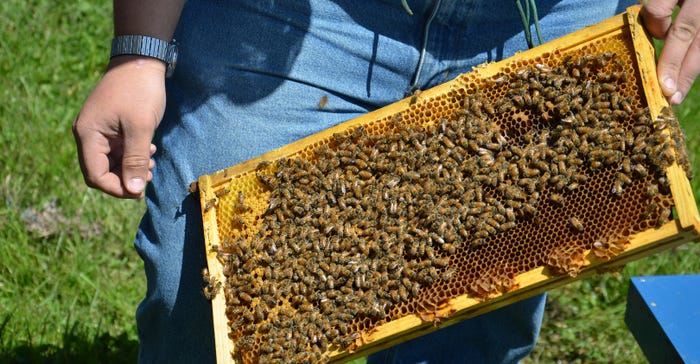
Robbie Armstrong, Southport, has been keeping bees and selling honey for five years. But he’s not your average backyard beekeeper. Armstrong, a Purdue University sophomore, has developed a business that includes making hives, rearing bees for others and selling his own honey.
Beehives and bees in general have been in the spotlight lately due to growing concerns about why some hives don’t perform well, and why bee deaths sometimes reach relatively high numbers. Some reports point a finger at neonicotinoid insecticides. But beekeepers like Armstrong believe there may be other reasons, as well.
He currently maintains about 30 hives. He also produces “nukes,” which are new colonies of bees, for sale to other beekeepers. While he experiences problems like anyone else, he says for the most part, his death losses are minimal.
“I believe it starts with providing good nutrition for your bees,” Armstrong says. “I have people who let me bring hives to their locations for the summer months. Several of them have pastures and hay fields nearby, plus crop fields.
“The problem with all crop fields around is that it is a monoculture. If you’ve got all corn or all soybeans, you’ve got less variety of pollen for bees to go after. They do best when they have choices,” he explains.
Toward the fall and into the winter, Armstrong provides sugar to his hives for nutrition. He has developed a system where he inverts a bucket of sugar water into a hive.
“I’ve literally bought a ton of sugar at the local supermarket before to get a better price,” he says. “You should see the look on a clerk’s face when you tell her you want to buy a ton of sugar.”
Factors in hive health
Maintaining and improving genetics is another factor in having healthy hives that will handle various conditions and survive well, Armstrong says. You may think genetics is only for large animals, but he practices selection with bees, as well.
It comes down to selecting strong queens and drones, he says. Sometimes he purchases queens, and there is a difference in quality in the queens you can buy, he notes.
There are a sizable number of people getting into beekeeping for the first time today, and many start with a few hives, Armstrong notes. He believes some issues with bee mortality may be linked to beekeepers who don’t yet have the experience to help their bees through difficult weather conditions.
Varoa mites are also an issue. There are ways to minimize their impact, Armstrong notes, but living with them is a fact of life.
Armstrong takes a realistic attitude when it comes to possible effects of seed treatment insecticides on honeybees. “I haven’t seen big problems that I thought were linked to it,” he says. “Actually, I believe we have to have a balance. I want to raise bees, and we need bees not only for honey, but to help pollinate various crops.
“At the same time, we need crops for food. Farmers need to be able to kill insects that could harm crops. It seems to me that we all need to work together to find a balance so that we can all do what we need to do.”
Enjoy this guided tour through Armstrong’s apiary and into one of his beehives You don’t even need a bee bonnet for this visit!
About the Author(s)
You May Also Like




